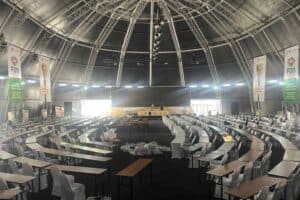Ramaphosa’s “national dialogue” looks more like a monologue, guided by carefully curated allies.

What do you think President Cyril Ramaphosa and colleagues mean when they talk about “our people”? Do you feel included? Many don’t.
There is reason for scepticism over Ramaphosa’s plans for an inclusive national dialogue. His approach throughout his presidency has not been inclusive.
“Our people” usually means ANC.
Inclusivity is not evident in the list of “eminent persons” whom he has named to guide “a people-led, society-wide process to reflect on the state of our country in order for us to reimagine our future”.
People-led? Yet he chooses the leaders of the process. One example is Roelf Meyer, Ramaphosa’s supposed adversary in the Codesa talks which preceded this country’s first democratic elections.
Meyer may have taught Ramaphosa fly-fishing, but the National Party minister fell hook, line and sinker for ANC tricks.
ALSO READ: ‘Bring all to dialogue’: Experts insist national dialogue must be people-driven
His capitulation was so complete that the ANC in Soweto nominated Comrade Roelf for its parliamentary list in 1994.
Meyer declined but in 2004, he voted ANC and joined that party in 2006.
Ja, nee. By choosing Meyer, Ramaphosa will have alienated quite a few Afrikaners who won’t feel included.
Why do we need a government-orchestrated national dialogue?
The nation is continually in dialogue.
We have regular elections and opinions are continually freely expressed across multiple platforms. Public participation is mandatory in many issues at all levels of government, even if this is often a tick-box exercise.
ALSO READ: Codesa 2 has many agendas to fill
South Africa is oversupplied with talk shops whose practical outcomes are negligible. We don’t need more of that. And we can’t afford it.
With economic growth at a low 0.8% in 2024 and unemployment now officially at 32.9%, it is reckless to splurge at least R700 million on this nebulous exercise.
After contestation over the national budget, you’d think Ramaphosa would be more circumspect about wasting money.
Big spenders of other people’s money have no qualms about stretching price tags.
Starting at R700 million, the proposed national dialogue could easily end up costing more than the R1 billion spent on the Zondo inquiry into state capture. And what did we get for that? Zero significant prosecutions. In practical terms, this dialogue will yield even less.
This national dialogue is an attempt to shore up the ANC’s political fortunes and boost Ramaphosa’s legacy. If, as expected, the process takes about a year, it will segue into the local government elections.
ALSO READ: Thandiswa Mazwai says she would’ve accepted invite to national dialogue had Ramaphosa sent it
Ramaphosa’s personally selected “eminent persons” will have ample opportunity to sway opinions without appearing to be on the campaign trail. From this perspective, cashstrapped taxpayers could be funding the ANC’s next local government election campaign.
Genuine dialogue requires a two-way exchange of ideas. Yet Ramaphosa and the ANC are implacably wedded to broad-based black economic empowerment (B-BBEE) in all its forms.
He recently defended it against arguments that B-BBEE stifles economic growth. A national dialogue would be beneficial if the ANC was able to listen, and to change course on B-BBEE.
A monologue or dialogue of the deaf won’t help.
The aims of the national dialogue are to increase inclusivity, boost economic growth and create employment opportunities. The best way to do that is to scrap B-BBEE laws that are, by definition, exclusive.
Reimagine a future without race laws. Now you’re talking.
Support Local Journalism
Add The Citizen as a Preferred Source on Google and follow us on Google News to see more of our trusted reporting in Google News and Top Stories.








